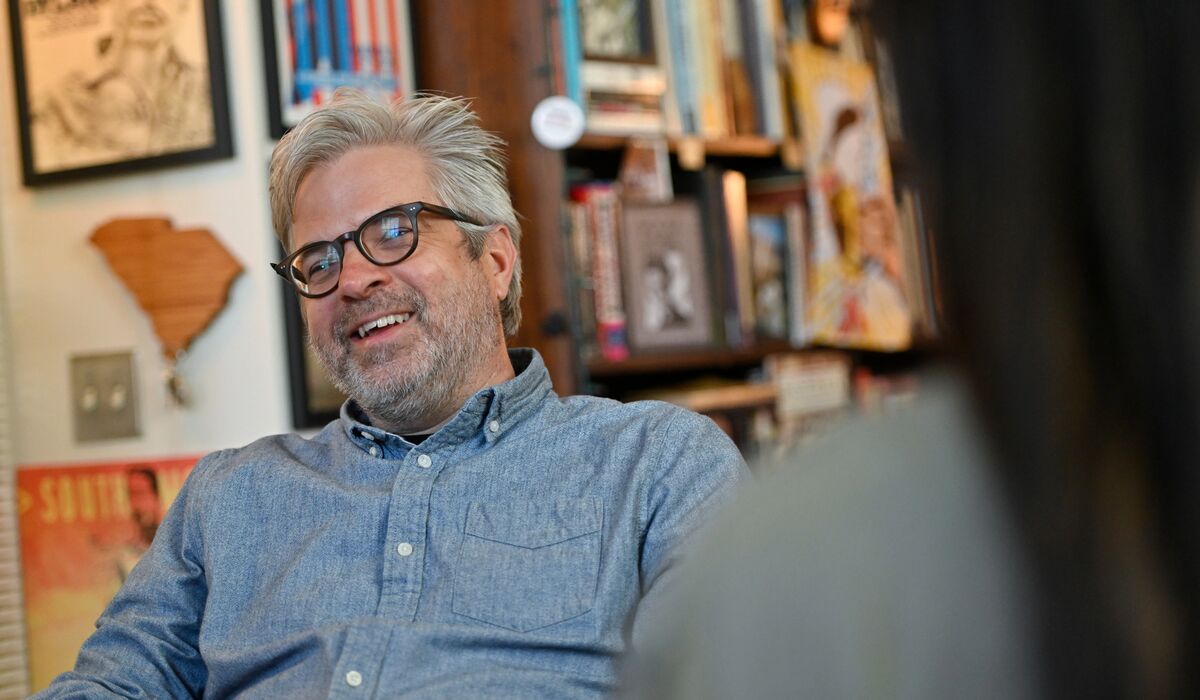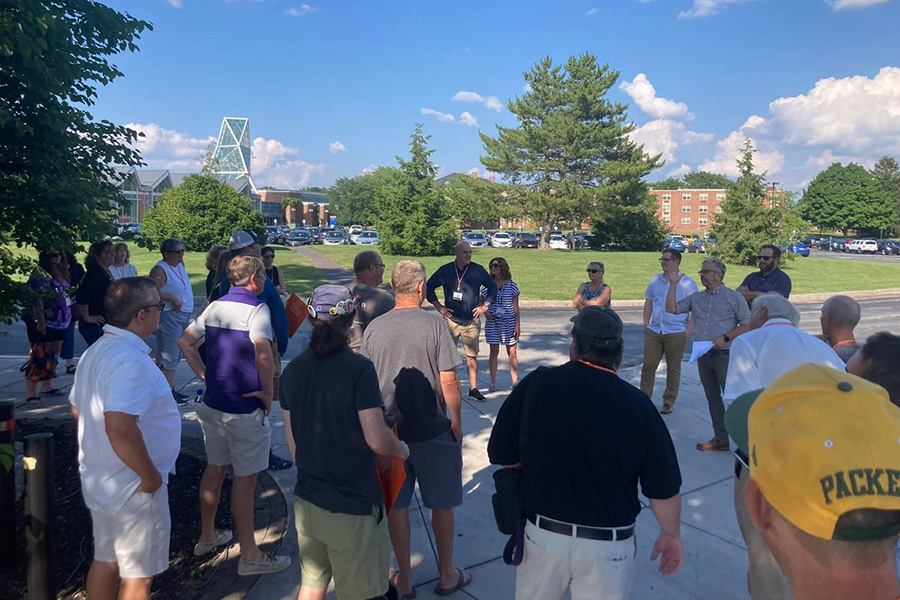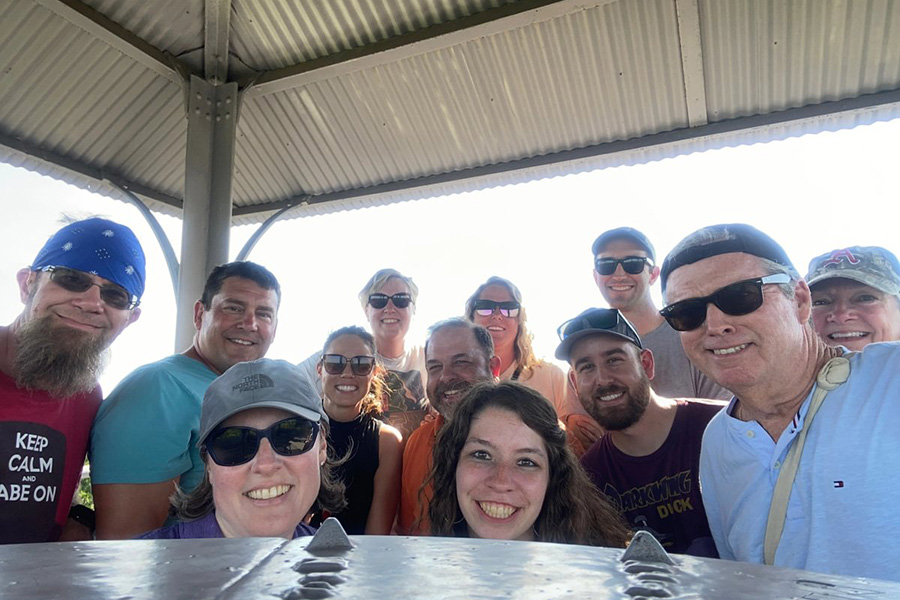
Our first-class faculty bring their knowledge to K-12 teachers across the nation, expanding their opportunities for lifelong learning and impact.
Public Policy Prof. Dave Powell recently received nearly $190,000 from The National Endowment for the Humanities (NEH) to support his workshop program for 72 K-12 educators, “On Hallowed Ground: Gettysburg in History & Memory.” Comprised of two one-week workshops, this program allows teachers to stay in Gettysburg while learning about the community’s role within our nation’s history during the Civil War.
Powell’s program was one of 240 projects awarded nationwide, totaling $37.5 million, to support research, education, preservation, and programming within the humanities. Specifically, “On Hallowed Ground” was one of 18 grants through the “Landmarks of American History and Culture” program, which received a total of $3.35 million. Through Landmarks programs, teachers learn about diverse history and culture at the site or region of the event, expanding their connection and broadening their approach to teaching.
“We’re focused on the interaction between the historical record and how people remember the past, which are not always in sync,” said Powell. “The mission here is to help teachers help their students learn about our culture and shared history by challenging teachers to develop a renewed sense of the significance of Gettysburg informed by current scholarship.”

Powell’s work on the program builds on his many years of experience as a teacher, educator, and member of the Education Department at Gettysburg and on his experience teaching history and social studies in Georgia’s Gwinnett County School District, which he did for seven years. The workshop’s teaching staff includes several current or former members of the Gettysburg College faculty, including Carol Reardon, adjunct professor of Civil War Era Studies; Ian Isherwood, associate professor of War and Memory Studies; Sarah Kate Gillespie, director of the Schmucker Art Gallery; and McKinley Melton, former associate professor of English at the College.
Powell wants to put a focus not only on teaching history, but also showing educators how to teach about Gettysburg to their students. With his experience, Powell brings the ideals of lifelong learning to other educators around the country, showing they can still bring the knowledge they built back to the classroom.
“You do all this preparation, you come here, and when you go home, you can’t just forget what you learned. [Prof. Powell] did a really good job communicating with us what the expectations were,” said Heather Hopkins, an eighth grade U.S. history teacher from Sault Ste. Marie, Michigan. “He was extremely passionate about the topic and bringing in passionate people. Everybody that came to talk was an expert, and Prof. Powell did a really good job putting everything together.”

Through “On Hallowed Ground,” the faculty team assembled to lead the workshop shows teachers that historical scholarship about Gettysburg and its significance continues to evolve as new voices and perspectives are brought into the conversation about the battle that occurred here and the larger Civil War. Seventh and eighth grade teacher Ted Frisbie from Carbondale, Colorado, was particularly interested in the aspect of collective memory around monuments, some of which have been torn down due to their controversial history over the past few years.
“I was struck by the policy of the [Gettysburg Battlefield] Memorial Association, which approved the first memorials on the battlefield,” Frisbie said. “They wanted to not incriminate nor validate either side. I started to create this model of structured academic controversy, where people engage in something that is controversial and have to come to a consensus without it being a debate.”
Earning this grant for the third time since 2014, Powell and his team have continued to refine and expand the workshop’s focus on collective memory, and Powell said projects like Frisbie’s illustrate the importance of doing that. “What happened here during the battle is obviously important, but it’s also important to focus on how we remember what happened here, because that plays a part in determining what gets done with that knowledge,” Powell said.
The first battlefield memorials were meant to tell the story of the battle in a certain way that focused on troop placement and military decision-making, but subsequent efforts to place additional monuments on the battlefield, especially during the Jim Crow era, told the story differently.
“The battlefield is a living, breathing monument to some of the best and worst aspects of the American experience, and we want to offer teachers a comprehensive view of how those pieces interact here,” said Powell.
Powell also noted the College’s continued focus on lifelong learning, citing the recent partnership with the Gilder-Lehrman Institute to create a master’s program in American history. This degree is fully online and accredited, offering a 30-credit program to K-12 educators, community college instructors, supervisors, museum professionals, librarians, and National Park Service employees affiliated with the GLI. Students learn from world-class faculty not only from Gettysburg, but also from Harvard University, Yale University, and Columbia University. Through the master’s program and Powell’s workshops, teachers become a wellspring of knowledge and learn new enduring skills that can then be passed down to their own students in classrooms across the country.
“I think one of the reasons our program has been successful is because of our strong focus on how to translate the content we teach into genuine teaching practices,” Powell said. “Being able to organize this for teachers and have them come here to learn about this great and enduring landmark in this enormously important place is a really great opportunity and we hope to continue doing it for years to come.”
Learn more about Gettysburg’s Landmarks of American History & Culture program, “On Hallowed Ground.”
Related Links:
External Links:
By Katie Lauriello ’25
Photos provided by Jason Minick, Prof. Dave Powell and Heather Hopkins
Posted: 10/15/24